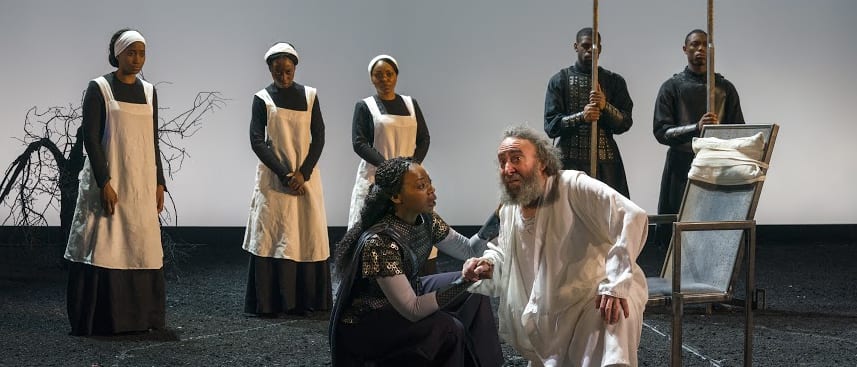It’s pre-Arthurian Britain, and madness spreads throughout the government like plague. A familiar scene unfolds: a raving king, teetering on the brink of senility, calls his three daughters to demonstrate their love for him in exchange for a kingdom. And when things don’t go as planned, events are set into motion for the entire country to rip itself apart. Passions dictate politics; this is King Lear.
King Lear, the story of a mad king, is widely regarded as one of Shakespeare’s greatest tragedies. The play follows Lear’s fall from total ruler to utter disgrace, stripping him not only of his power and wealth, but of his loved ones as well. All the while, rivalries spark into life around him, even as his own world grows darker. It’s a daunting show – and a daunting character – to take on. But it’s certainly one that the Royal Shakespeare Company is prepared for. Of course, they come armed with a good production budget, a large ensemble, and a reputation stretching back decades. But notwithstanding these crucial elements, the company seems to have a formula for striking a balance between Shakespeare’s historical and classical context, and his ability to appeal to the nuances of a modern audience – and director Gregory Doran brings this effect in full force to the stage at the Brooklyn Academy of Music.
This particular production is a momentous one, as King Lear allegedly marks the final Shakespearean role of Antony Sher. Having become Richard III, Shylock, Macbeth, Falstaff, and many other Shakespearean leading men in a decades-long career, Sher has announced that “there’s nowhere else to go” after playing Lear (according to TheaterMania). And Sher’s Lear does not disappoint. He plays the king’s fall from grace with subtlety and skill, bringing out the best and the worst of Lear and yet still preserving him as an endearing, if deeply flawed, man.
There is no shortage of talent among the cast. In the role of Edmund, the illegitimate son of the Duke of Gloucester, is Paapa Essiedu. With a sarcastic slip of the eye through the fourth wall, Essiedu elevates the audience to Edmund’s point of view, one to which he brings the wit of Hamlet and the cunning of Iago, making us complicit in his plot and even a little sympathetic for an otherwise unquestionably villainous man. Nia Gwynne and Kelly Williams as Lear’s eldest daughters also play up the sympathy of their characters so spectacularly that you want to root for them – at least, until eyes start getting gouged out. And Mimi Ndiweni perfectly embodies the integrity of sweet Cordelia.
Doran – who is also the RSC artistic director – conjures for Lear a vision of Britain that is dark and full of smoke. The production makes enormous use of visual effects, most notably in the scene which finds Lear screaming into a thunderstorm. The costumes, too, are designed to stun – and to speak. Edmund rises from the simple black tunic of his father’s servants to glittering gold patterns and regal capes; by contrast, Lear descends into madness, shedding layers of clothing, losing his heavy gold crown and chains and thick furs until he dies in just a thin set of underclothes.
But perhaps the RSC’s King Lear’s greatest triumph is the way that it so actively engages the audience. The cast, the effects, and every directorial choice seem primed to connect the people with the story. And though it may not have been the intention, such a character as Lear – a ruler who prizes flattery over logic – hits a sore spot with an audience searching for catharsis. I couldn’t help but wonder if it had been specially curated for the New York run the pointed way that Gloucester (David Troughton) intones: “Tis time’s plague when madmen lead the blind” – and then basks in the instant commiseration of the audience that he knows is coming.

